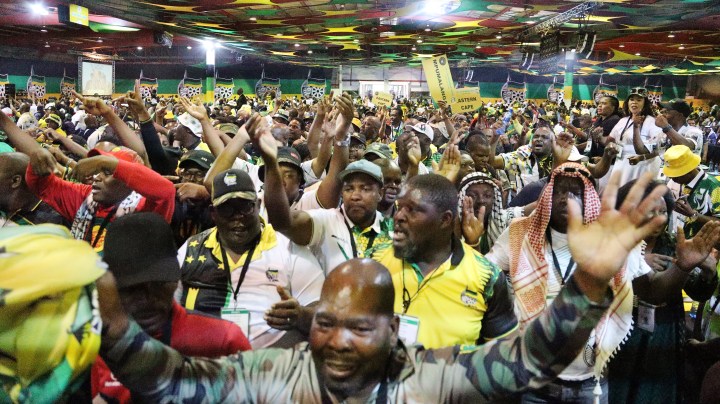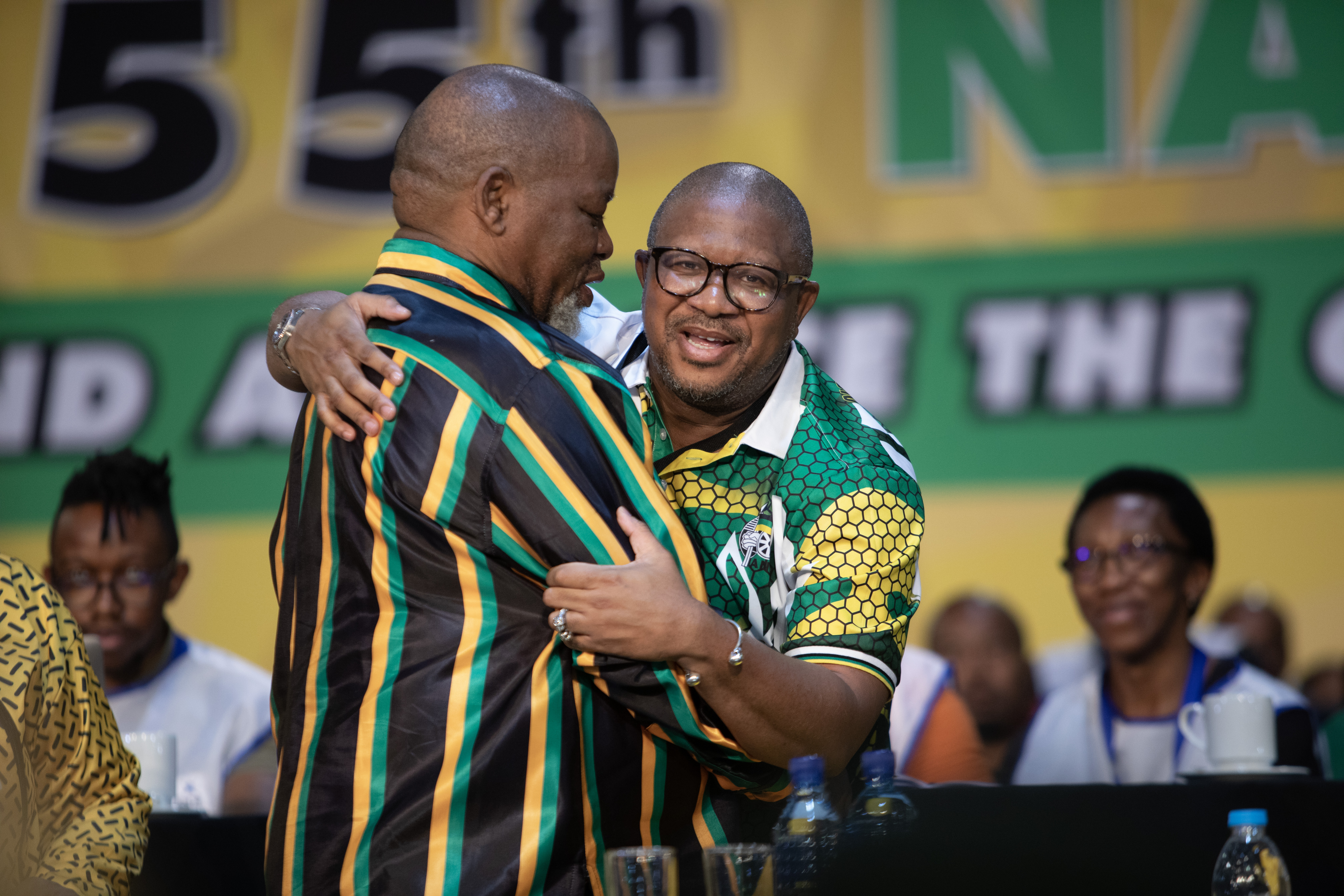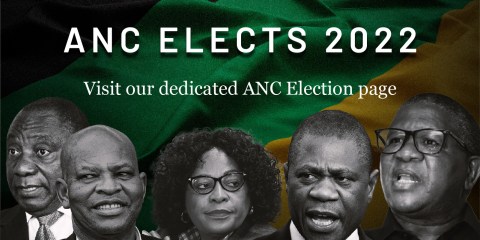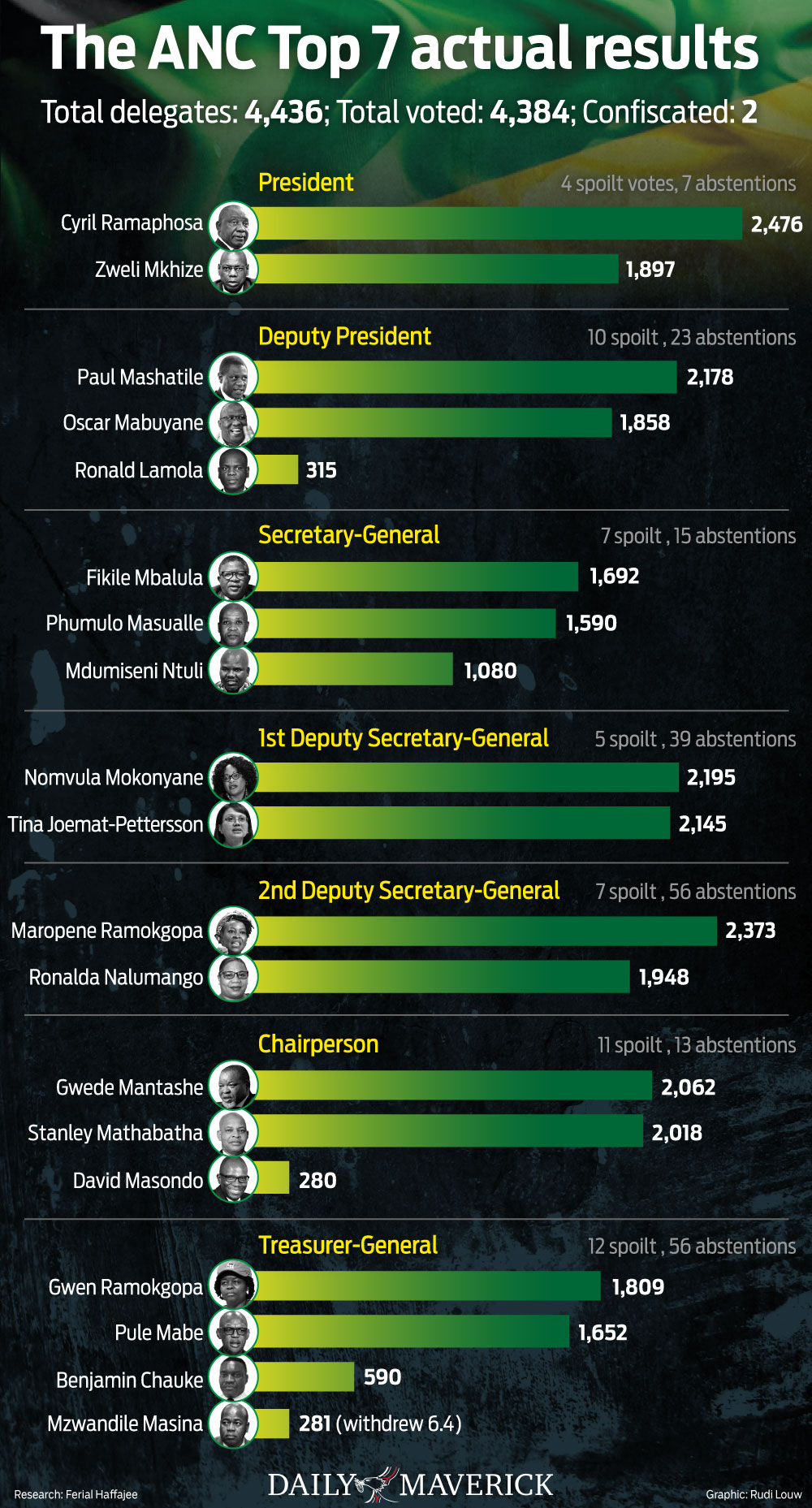ANALYSIS
In the wake of Ramaphosa’s victory, SA is still depressed, divided and desperate for true leadership

The final results of the ANC’s elections for its top seven national officials reveal much about the party and South Africa in this very moment. In short, while the stability this result implies may well be good for the country in the shorter term, there is a strong underlying weakness and brittleness of the ANC right now. It is clearly badly divided – it can give the impression of almost collapsing in some areas.
Much of the ANC’s apparent weakness likely comes from the fact that our state itself has become so weak. Thanks to this ANC-induced failure, the result of this election might not matter nearly as much as a similar election did just five years ago, or even after the 2007 Polokwane conference.
While the results of this election appear to suggest that President Cyril Ramaphosa emerges in a relatively strong position, this does not necessarily mean that the ANC itself is stronger.
It is true that he has more support in the top positions than he has had in the past, which could be crucial in some ways. It may give him more space to manoeuvre and to continue with his claimed agenda of renewal.
Perhaps more important than almost anything else is that the National Prosecuting Authority (NPA) and the criminal justice system as a whole may be allowed to continue the work they have finally managed to embark on after years of delays and deliberate sabotage.
This, more than anything, could be vital to our future as a country: if the NPA is able to properly and independently prosecute those who are corrupt, our politics, and our country, could soon change dramatically.
Should that not be the case, it is much more likely that the state will continue to slide into the abyss.
That said, it is important to understand just how close so many of the actual results in the ANC were.
For example, Gwede Mantashe beat Stanley Mathabatha to the position of National Chair by just 44 votes.
To get to that point, Mathabatha had told his delegates to go against the decisions of their branches and to vote for Zweli Mkhize. It is likely that some, or many of those delegates, defied him.
Now he may face political consequences.
There is evidence of this in Gauteng, too, where the provincial leadership represented by Lebogang Maile claimed the province was moving away from Ramaphosa, with the leader of at least one region disagreeing.
Later, Gauteng ANC leader Panyaza Lesufi said the leadership was happy with the outcome, including Ramaphosa’s victory.
This kind of continuous division is likely to lead to serious problems, with repercussions in several provinces and regions.
In particular, the province of KwaZulu-Natal – once again denied a position in the top seven leadership – is likely to see recriminations. Police Minister Bheki Cele said it was entirely their fault that they ended up in this position. This may be an important step on the province’s 10-year trip from total political dominance to national political irrelevance.
The fact that other positions, such as that of secretary-general, first deputy secretary-general and treasurer were also close may translate into provinces, branches and regions coming away incredibly frustrated.
There are other issues, too.
Ramaphosa is most likely relieved that Fikile Mbalula has won the position of secretary-general. It was the stated wish of his slate, and Mbalula has shown himself to be a strong supporter of Ramaphosa many times in the past.
But he has also shown himself to be a liar – a man whose instinctive posture, when faced with criticism, is way too often to lie.

Newly-appointed chairperson Gwede Mantashe and secretary-general Fikile Mbalula at the ANC’s 55th national conference in Johannesburg, South Africa on 19 December 2022. (Photo: Leila Dougan)
It is well-known that the secretary-general’s office is difficult to run. It requires a cool head and impressive political skills. Mbalula may find it difficult to assert his authority here. This could lead to a continuation of the administrative problems the party has had over the last few years.
On the other hand, he is likely to have energy, which the position desperately needs. He may also have more support in the position than the never-comfortable Ace Magashule, and that may make a difference. Still, Mbalula may still present a longer-term risk for the ANC.
While the inner workings of the ANC are important to the movement, it may also be losing power and strength simply because South Africa, the country to which they were given the keys in 1994, is in a shambolic state.

In the run-up to the 2017 ANC conference, many journalists resorted to having their phone conversations over WhatsApp simply because they were more difficult to monitor. Evidence revealed during the Zondo Commission has confirmed that the State Security Agency was being used for political purposes while also being looted.
This was a sign of the strength of the state, and the strength of the control of then president Jacob Zuma over it.
Much has since changed.
Now the state is so weak that the journalists seeking to speak to newsmakers call on WhatsApp in the hope that they are in an area with working Wi-Fi, because load shedding is so bad the cellphone towers don’t work properly.
This pattern is repeated throughout our society.
Water provision is bad for people across the land, like in Sol Plaatje Municipality, where there has been no water for several days and will be without for several more. Nelson Mandela Bay is still desperately short of drinking water after years of increasingly urgent warnings.
Nowhere is this more desperate than in the sheer number of violent crimes being committed. This surely reflects a weakness in our police.
In communities around the country, services do not work. Roads are mostly destroyed. Eskom has been near collapse for years. South Africa is on the edge of its own incompetence and corruption-fuelled Dark Age.
Instead of the State Security Agency being used primarily for political purposes, it is so weak it could not, or would not, even predict or warn against the violence last year in KwaZulu-Natal and Gauteng.
While it may be a relief to many that the air of menace has departed, what’s remaining is still incredibly dangerous.
People are frustrated and angry, and believe they deserve better. (They do deserve better.)
Within all of that is yet another dynamic.
It is now clear that whoever is the president of South Africa will never be as powerful as former presidents Mbeki and Zuma were in the past. Too much has changed. The ANC is dramatically weaker internally; the state is dramatically weaker externally.
It should be remembered here that South Africa is not alone in this.
Around the world, many societies are experiencing levels of distress, as rising food prices, high energy prices, dramatic increases in the cost of living and the rise of authoritarian regimes take hold all over the world.
While this is widely reported on in democracies like the UK, it is also true of countries like China, where the aftermath of the pandemic is still being felt.
In the face of this, our government and the ANC appear almost powerless.
It could be for this reason that there might be a relatively muted reaction to this election result within the greater society. Instead of the grand television moments that were the election announcements at Polokwane in 2007 and Nasrec in 2017, it may be that much of South Africa just wants to get on with life.
Most of the country appears to have left the ANC behind. And no ruling party politician should blame anyone but themselves for that. DM




















Thank you very much for a very thoughtful and accurate summary of the current state of affairs. The party and government will continue to limp along and continue to decline. The country needs to grow beyond the Party, and really prepare for a significant transition after the next elections. That will be the opportunity for the country to move forward and address the crises that it faces. There will be no significant progress addressing them before then. There is no capability or will.
Whoever does it- SA needs common sense, energy, ability to understand priorities and consequences. No enabling business environment (including and especially small businnes), no investment. No investment, no business growth. No business growth, no jobs/income. No income, no spending/no taxes. And no human dignity for those who have to try and live on 350/month. We need fast, hard hitting interventions right now. At all levels. We need to act immediately.
Thank you Stephen-a sobering article but entirely predictable in context of the time and effort wasted by the ANC and the loss of a full year of posturing and lobbying in preparation for the weekend just past when there were far more important tasks for the (not) governing party. Nothing has changed or will and the status quo continues.
Cannot understand the apparent euphoria of other journalists, the markets and business at the outcome -unless its relief (and how sad is that?) that an even more unpalatable alternative was avoided.
Respectfully it is meaningless and trite just saying “We need fast, hard hitting interventions right now. At all levels. We need to act immediately” without any suggestions as one commentator has done. Such has been said endlessly by many but there has to be a new direction to move forward in a positive manner rather then drift aimlessly with a future collapsed ANC. Sad to say the only party with proven capability can never attract the numbers required. The Rivonia Circle with Songezo Zibi in combination with that party and other like-minded competent groupings could be such an amalgamation. Can DM and its excellent team (including Stephen) stand back from its antipathy and make a reasoned analysis and see what might be achievable-that would be a very worthwhile start.